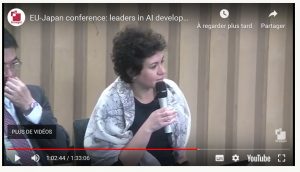Notre collègue, Professeur Grazia Cecere, invitée à cet événement a apporté sa vision de l'Intelligence Artificielle :
Competition policy in the era of AI – the case of Japan and Europe : How can artificial intelligence have a positive impact on the economy? How does AI impact competition policy? How can the EU and Japan become leaders in AI?
(24 octobre 2019)
This year’s EU-Japan conference, jointly organised by Bruegel and The Graduate Institute, Kobe University, will discuss Competition policy in the era of Artificial Intelligence.
The conference will discuss the challenges brought by the economic impact of AI, with particular focus on the impact on competition as well as related policy challenges and ways to increase AI’s positive impact on the economy. We will also discuss the role of EU and Japan in the ongoing process of AI development. The focus on AI for this coming year is specifically relevant as Japan, like Europe as a whole, is at risk of being over-shadowed by the US and China. After the signature of the EU-Japan Partnership Agreement there is also much more scope and a strong ground for collaboration between the two regions.
Welcome remarks
Guntram B. Wolff, Director
Opening remarks
Noritsugu Nakanishi, Dean, Graduate School of Economics, Kobe University
Session I: AI as new driving force of economic growth
Chair: Giuseppe Porcaro, Head of Communications and Events
Grazia Cecere, Professor of Economics at Institut Mines Telecom, Business School, LITEM.
Taiji Hagiwara, Professor, Graduate School of Economics, Kobe University
Yuko Kawai, General Manager for Europe and Chief Representative in London, Bank of Japan
Session II: EU and Japan - leaders in AI development
Chair: Agata Wierzbowska, Associate Professor, Kobe University
Eric Badiqué, Adviser for Artificial Intelligence, European Commission, DG Connect
J. Scott Marcus, Senior Fellow
Tatsuji Narita, Councillor, Secretariat of the Headquarters for Digital Market Competition, Cabinet Secretariat, Japanese Government
![[del.icio.us]](https://defi.imt-bs.eu/wp-content/plugins/bookmarkify/delicious.png)
![[Facebook]](https://defi.imt-bs.eu/wp-content/plugins/bookmarkify/facebook.png)
![[Google]](https://defi.imt-bs.eu/wp-content/plugins/bookmarkify/google.png)
![[LinkedIn]](https://defi.imt-bs.eu/wp-content/plugins/bookmarkify/linkedin.png)
![[Technorati]](https://defi.imt-bs.eu/wp-content/plugins/bookmarkify/technorati.png)
![[Twitter]](https://defi.imt-bs.eu/wp-content/plugins/bookmarkify/twitter.png)